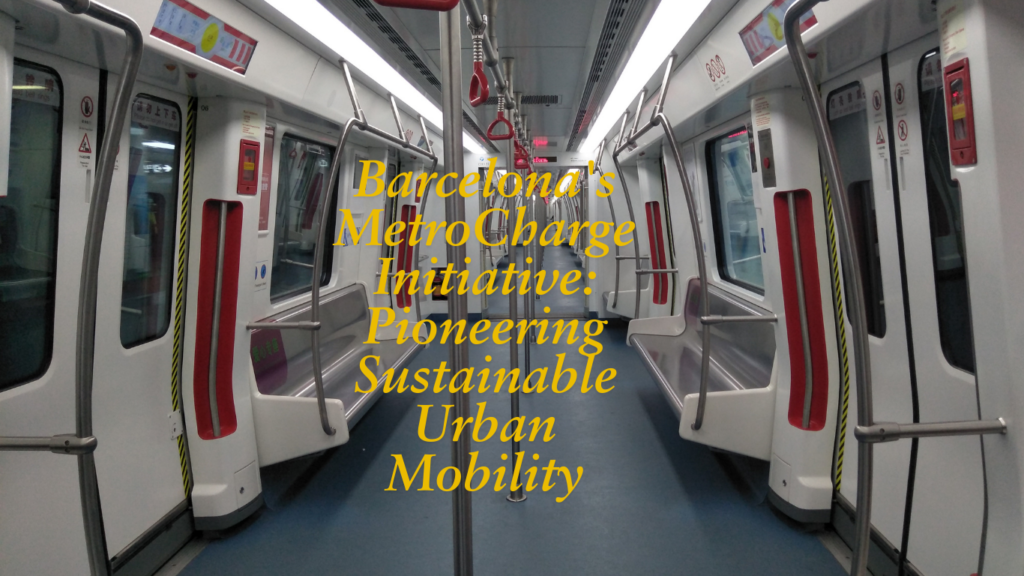Barcelona’s MetroCharge Initiative: Pioneering Sustainable Urban Mobility
Urban mobility systems are often perceived as significant contributors to environmental pollution and energy consumption. However, cities like Barcelona are proving that transportation networks can also be catalysts for sustainability. The city’s MetroCharge initiative is an exemplary project that demonstrates how existing infrastructure can be repurposed to promote clean energy solutions.
By recycling energy from subway trains’ braking systems and integrating this energy into electric vehicle (EV) charging points, Barcelona is taking significant steps towards sustainable urban transport.
The Genesis of MetroCharge: Harnessing Regenerative Braking
Regenerative braking is a technology that allows vehicles to recover energy typically lost during braking. In subway systems, this principle is applied when trains decelerate, converting kinetic energy into electricity. This electricity can then be reused, making the braking process not just energy-neutral but energy-generative.
Barcelona’s MetroCharge project takes this innovation a step further. Instead of merely recycling braking energy back into the metro system, MetroCharge diverts it to power nearby infrastructure. By installing specialized systems in subway stations, the energy captured during braking is collected, stored, and redirected to various applications, including electric vehicle charging stations.
This dual-purpose use of regenerative braking is a game-changer in the quest for clean energy in urban settings.
The Mechanics Behind MetroCharge
At the heart of MetroCharge is an advanced energy management system that integrates regenerative braking technology with EV charging infrastructure.
- Energy Storage: This energy is then stored in high-capacity batteries or fed directly into the grid, depending on the real-time demand.
- Energy Distribution: Through a sophisticated network, the stored energy is redirected to EV charging stations located near metro stations, providing a convenient and sustainable charging option for urban commuters.
- Smart Integration: The system’s smart technology ensures that energy is distributed efficiently, balancing metro operations and EV charging needs.
Sustainable Urban Mobility: A Multifaceted Approach
MetroCharge represents a holistic approach to sustainable urban mobility, addressing multiple aspects of the clean energy transition. The initiative not only enhances the energy efficiency of public transportation but also accelerates the adoption of electric vehicles, which are critical for reducing greenhouse gas emissions in cities.
- Promoting EV Adoption: By offering convenient and eco-friendly charging options at metro stations, MetroCharge removes one of the major barriers to EV adoption—the lack of accessible charging infrastructure.
- Reducing Energy Waste: Energy that would otherwise be wasted during train braking is repurposed, creating a circular energy economy. This maximizes resource utilization and minimizes environmental impact.
- Integrating Renewable Energy: MetroCharge aligns with Barcelona’s broader clean energy initiatives by complementing other renewable energy sources like solar and wind. The stored braking energy can act as a buffer during peak energy demands, enhancing the city’s energy resilience.
Challenges and Solutions in Implementing MetroCharge
While the MetroCharge initiative is groundbreaking, its implementation has not been without challenges. Developing such a system involves navigating technical, financial, and logistical complexities.
Technical Challenges: Integrating regenerative braking systems with EV charging infrastructure requires cutting-edge technology and seamless coordination between different systems. Barcelona tackled this by collaborating with leading technology providers and engineers to design and implement a robust energy management network.
Financial Investment: The initial costs of retrofitting metro systems and building charging stations are substantial. To address this, the city secured funding from both public and private sources, showcasing the importance of collaborative investment in sustainable projects.
Logistical Coordination: Coordinating metro operations with energy redistribution posed a logistical challenge. However, the use of real-time data analytics and smart grid technology ensured efficient energy flow without disrupting metro services.
Global Implications: Setting a Precedent for Other Cities
Barcelona’s MetroCharge initiative is more than a local success story; it is a blueprint for sustainable urban mobility worldwide. The project illustrates how cities can leverage existing infrastructure to create innovative energy solutions, reducing both costs and environmental impact.
Scalability: The MetroCharge model can be adapted to other urban transit systems, regardless of size or geography. Cities with established subway networks can retrofit their systems with regenerative braking and energy storage technologies to replicate Barcelona’s success.
Policy Inspiration: MetroCharge underscores the importance of supportive policies and regulatory frameworks. By prioritizing clean energy projects and offering incentives for innovation, governments can accelerate the adoption of similar initiatives globally.
Public Awareness: The initiative also serves as a powerful tool for raising public awareness about the potential of clean energy. By witnessing the tangible benefits of projects like MetroCharge, citizens are more likely to support and engage with sustainability efforts.
The Role of Collaboration in MetroCharge’s Success
One of the key drivers behind MetroCharge’s success is the collaboration between various stakeholders. The project brought together the city government, transit authorities, technology companies, and energy providers to achieve a common goal. This multi-stakeholder approach ensured that the initiative was not only technologically feasible but also financially viable and socially impactful.
- Public-Private Partnerships: By partnering with private companies, Barcelona accessed cutting-edge technologies and expertise, while also sharing the financial burden of the project.
- Community Engagement: The city engaged local communities and commuters to ensure that the project aligned with public needs and expectations.
- International Collaboration: Barcelona also collaborated with international organizations to exchange knowledge and best practices, further enhancing the project’s effectiveness and scalability.
Integration with Smart Cities:
MetroCharge can be integrated into broader smart city frameworks, where data from various urban systems is used to optimize energy use and reduce emissions further.
Expansion to Other Transit Modes:
The technology could be adapted for buses, trams, and other forms of public transport, amplifying its impact on urban mobility.
Enhanced Energy Storage:
Advances in battery technology could improve energy storage capacity, making the system even more efficient and reliable.
Conclusion
Barcelona’s MetroCharge initiative is a testament to the power of innovation in addressing the challenges of sustainable urban mobility. By repurposing regenerative braking energy for EV charging and other applications, the project not only enhances the city’s public transportation system but also contributes to its clean energy goals.
MetroCharge exemplifies how urban infrastructure can be leveraged for sustainability, setting a precedent for cities worldwide. As more urban centers face the dual challenges of rapid growth and environmental sustainability, initiatives like MetroCharge offer a roadmap for a cleaner, greener future.
Summary: Discuss Barcelona’s innovative project that recycles energy from subway trains’ braking systems to power stations and provides electric vehicle charging points, contributing to the city’s clean energy efforts.
Key Opinion: MetroCharge exemplifies how urban infrastructure can be leveraged for sustainable energy solutions, setting a precedent for cities worldwide.
Focus Words: MetroCharge, regenerative braking, sustainable urban mobility, electric vehicle charging, clean energy
SEO Keywords: Barcelona MetroCharge project, regenerative braking energy, sustainable urban transport, EV charging infrastructure, clean energy initiatives, Barcelona protocol, Barcelona charged, spain barcelona metro, barcelona charge,, Pioneering Sustainable Urban Mobility, sustainable and smart mobility strategy, urban mobility strategy,
what is urban transport, sustainable transport europe, EU urban mobility observatory, sustainable transport strategy, sustainable transportation, eltis mobility, pioneering sustainable urban mobility, pioneering sustainability, urban pioneering, urban mobility authority



